Spend over $60 and receive free shipping!


We’re proud to announce the second edition of our Good Coffee Doing Good program. Together with our Colombian green bean partners Cofinet, we are thrilled to feature two outstanding coffees from producer Auricel Conde. Through sales of these coffees, we will raise funds to construct a new fermentation tank for Auricel’s farm, which will help Auricel and other local farmers to produce better coffees and improve their livelihoods.
__
Last year we launched our Good Coffee Doing Good program as a way to focus on specialty coffee through the lens of people and community. At Padre Coffee, we believe in the importance of fostering meaningful long term relationships: with our suppliers and customers, our peers, our partners and colleagues. At Padre, people are celebrated, relationships are prioritised and our connection to our community is a primary focus.
We aim to use our position, skills and privileges to support people across our communities, be that within our own teams, in our customer base, our wider network and also at origin, where our precious coffees are grown. We choose to feature only specialty grade coffees, not only because they are of high quality and they taste incredible, but because we know the farmers who work tirelessly and sacrifice so much to produce these coffees get paid fairly for their efforts. To us, Specialty Coffee is not just fancy branding and nice packaging, but a guarantee of provenance and of ethical and sustainable practices.
One way we engender this is to ensure that we work closely with our suppliers, creating long term partnerships that are mutually beneficial. This leads to a high level of trust and respect throughout the supply chain, leading to better outcomes across the board.
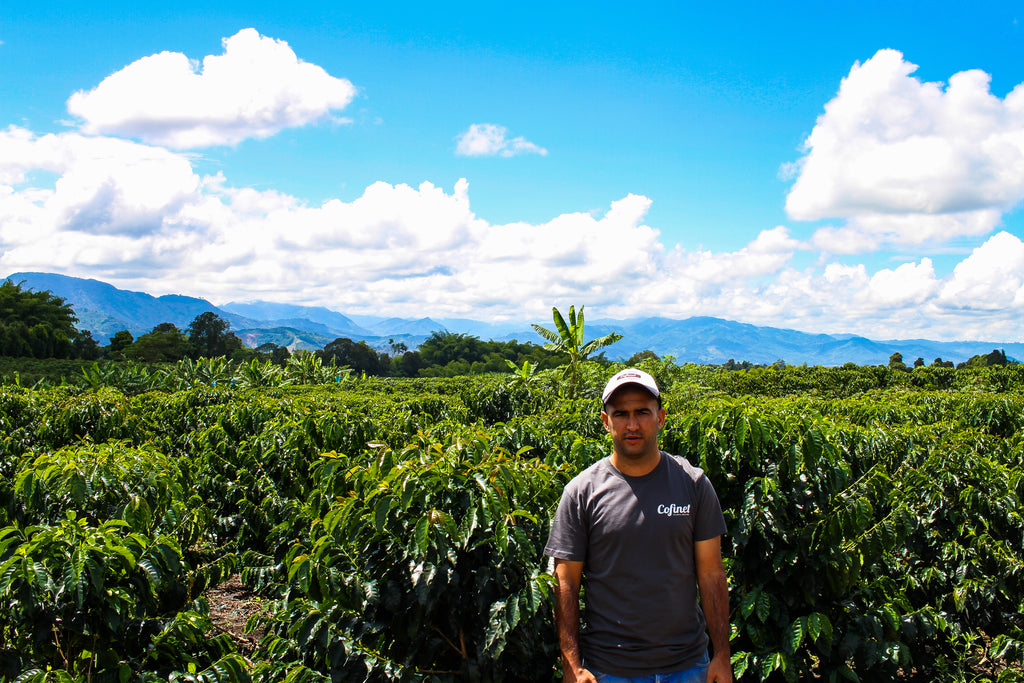
Felipe Arcila, cofounder of Cofinet, with some coffee plants and the beautiful Colombian landscape
One of the strongest relationships we’ve nourished over the last few years is with Carlos and Felipe Arcila at Cofinet. It’s hard to encapsulate exactly what Cofinet is succinctly, because they cover so many different and important aspects of the coffee supply chain. First, they are fourth-generation coffee farmers and produce incredible coffees at the family farm - La Pradera (“the meadow”) - in Armenia, Quindío in Colombia’s west. Over their 80-year history, they have really proven themselves as leaders in so many aspects of coffee production. They are pioneers in alternative processing methods and champions of exotic varietals, which is no mean feat in a country where coffee was, until very recently, governed very strictly by the Colombian Coffee Growers Federation. So tightly so, in fact, that until 2016, it was forbidden to export anything other than washed coffees.
In 2015, Cofinet began exporting their coffee to the world, having previously relied on intermediaries. They also now represent a number of other Colombian specialty coffee growers, providing unmatched support and generously providing access to their infrastructure and facilities at La Pradera.
Additionally, they offer an internship program, educating their partners to produce better quality coffees and therefore improve their livelihoods. Over six days at La Pradera, the Cofinet team provides hands-on education and support with alternative processing methods such as aerobic and anaerobic fermentation. Following the six-day intensive, Cofinet visits the participants’ farms and oversees their initial trials of the newly learned techniques, committing to purchasing the lot regardless of the outcome so the producer can learn without any attached risk. It’s a gesture that speaks to Cofinet’s values and their mission to improve the quality of Colombian specialty coffees and celebrate them on the world stage.
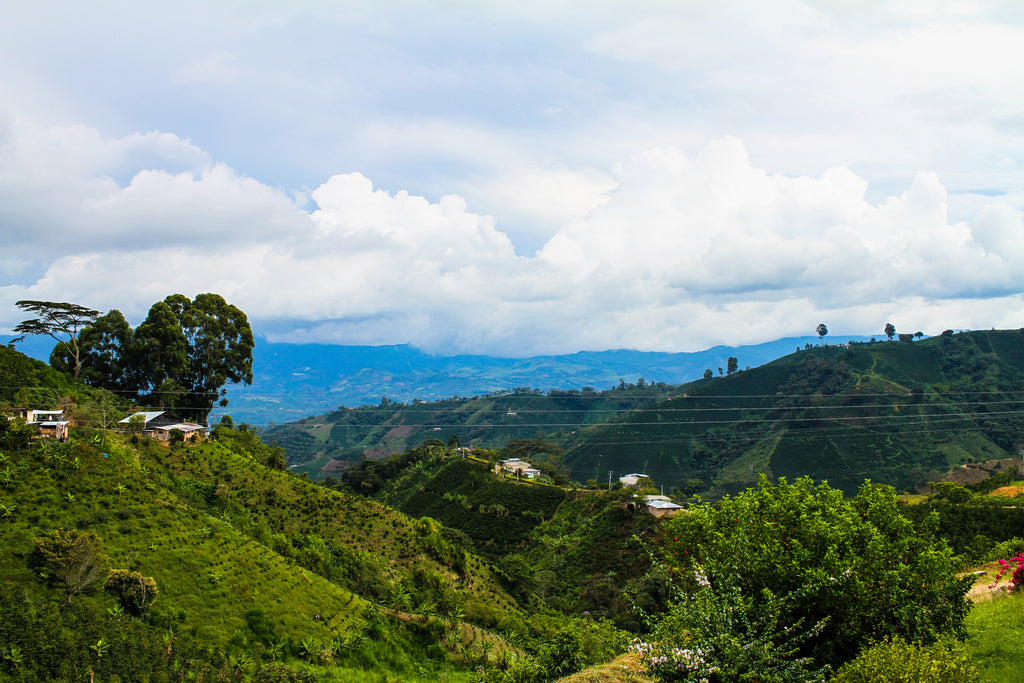
Stunning views in Colombia
We’ve been partnered with Cofinet since they began trading internationally in 2015. Carlos Arcila, co-founder of Cofinet with his brother Felipe, was living in Australia, having completed his postgraduate studies in Sydney. He emailed our Director of Coffee, Fay Kamanis, asking if we would be interested in meeting him and sampling some of Cofinet’s coffees.
Back then, Colombian specialty coffees had very limited representation in Australia, which meant it was difficult for roasteries to come by unique coffees. So Fay - and the rest of us - were very excited to taste something new. We’ve been partnered with Cofinet ever since.
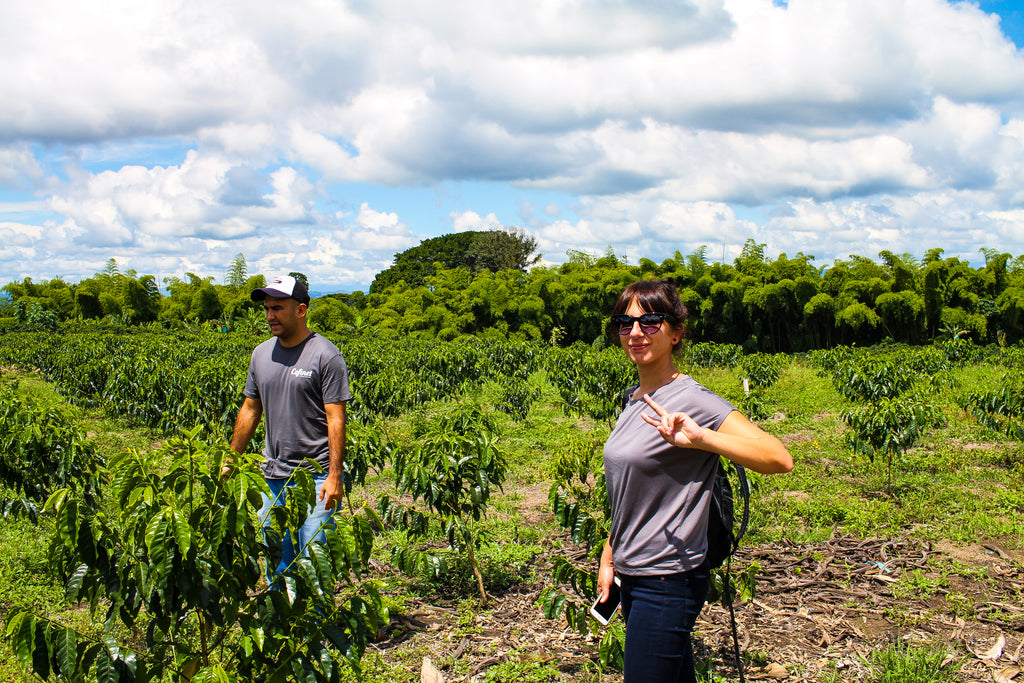
Felipe Arcila and Fay Kamanis in Colombia, 2017
Along with the incredible quality of the coffees Cofinet consistently has on offer, and their commitment to education and growth, Fay credits their authenticity and sincerity for why we have become “completely open and trusting in our relationship” with them. What follows is complete transparency and honesty, from both parties.
For those of us who deal with Cofinet in Australia, Carlos really is that genuine link. While Felipe is the backbone of the company in Colombia, searching out new regions and producers, and their father Jairo takes care of the family farm, Carlos is the face of the company here. He’s incredibly personable and friendly, and so generous with his - and the company’s - time, knowledge and resources.
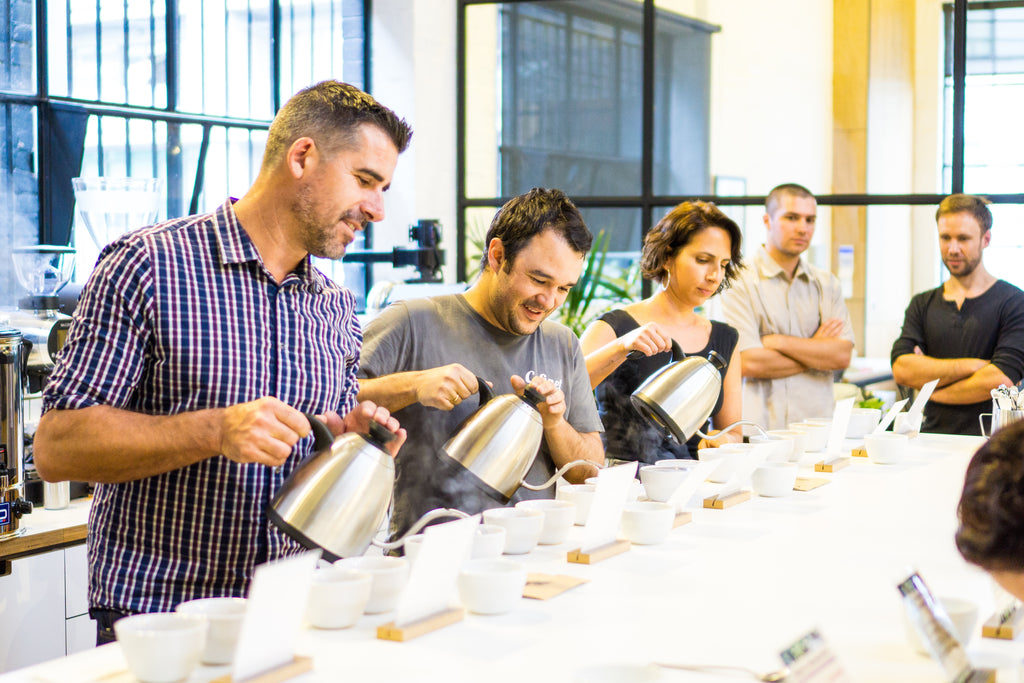
Marinus Jansen, Carlos Arcila and Fay Kamanis at a Cofinet cupping held at Padre Coffee HQ in 2018
Something Cofinet has come to offer their roaster partners is a hosted trip to Colombia, to see La Pradera, meet the people of Cofinet and explore some other regions and farms. Their aim is to help foster long term relationships and direct trade between international roasters and Colombian producers.
Fay and our founder and managing director, Marinus Jansen, were lucky enough to accept such an invitation to travel to Colombia in November, 2017. What followed was a humbling, insightful and enlightening experience. As Fay says, “it opened things up for us in a really positive way”.
Cofinet generously hosted the group from Australia at La Pradera, providing food and accommodation for the week. There, they cupped some incredible coffees, got to witness post-harvest activities and processing, and even saw the tail end of the picking. They also travelled to other farms around Quindío and Risaralda, and got to see some of the exotic varietals I spoke about earlier.
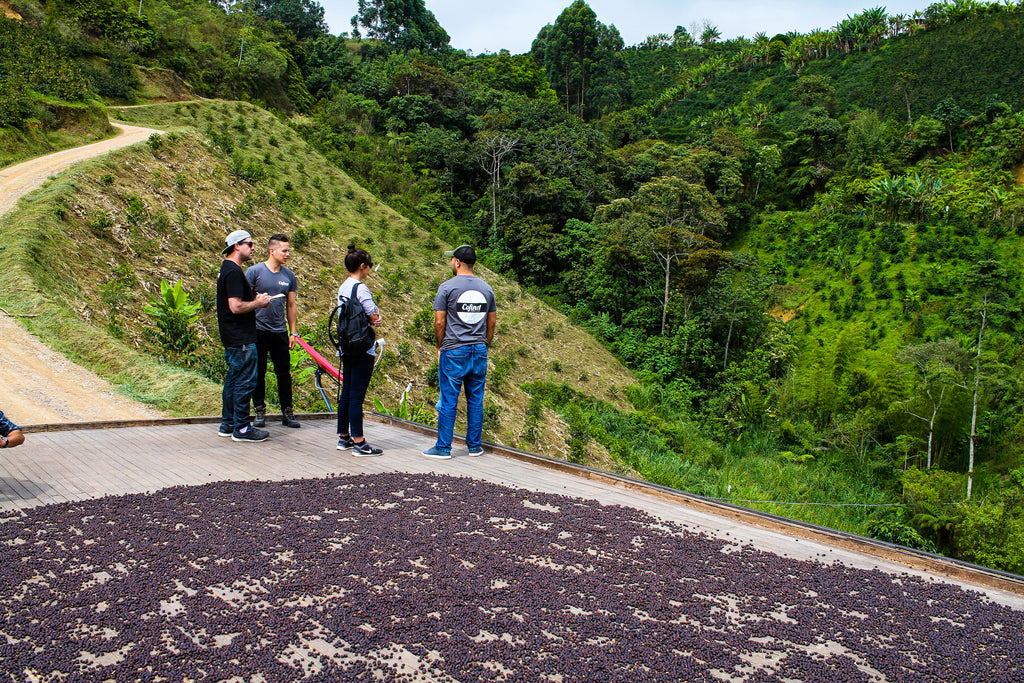
The group with some coffee laid out to dry, including Fay Kamanis and Felipe Arcila, far right. Colombia, 2017.
One of the other Australians on the trip was a young man named Eli Galbally. At that time, Eli was working with Disciple Roasters and he had been in South America for a while prior to Marinus and Fay’s arrival. He was at La Pradera to greet them when they arrived, with the bright-eyed excitement and attentive energy that we would all come to know very well.
“I remember him being quite energetic,” says Fay; he had just popped out from the kitchen, where he had been helping to prepare the evening’s meal. It would come to be something he was known for - generously offering his assistance to anyone who needed it. Marinus says he was “eager to help out and get involved”; and he had “not a word of Spanish in his vocabulary, but not a bad intention either”.
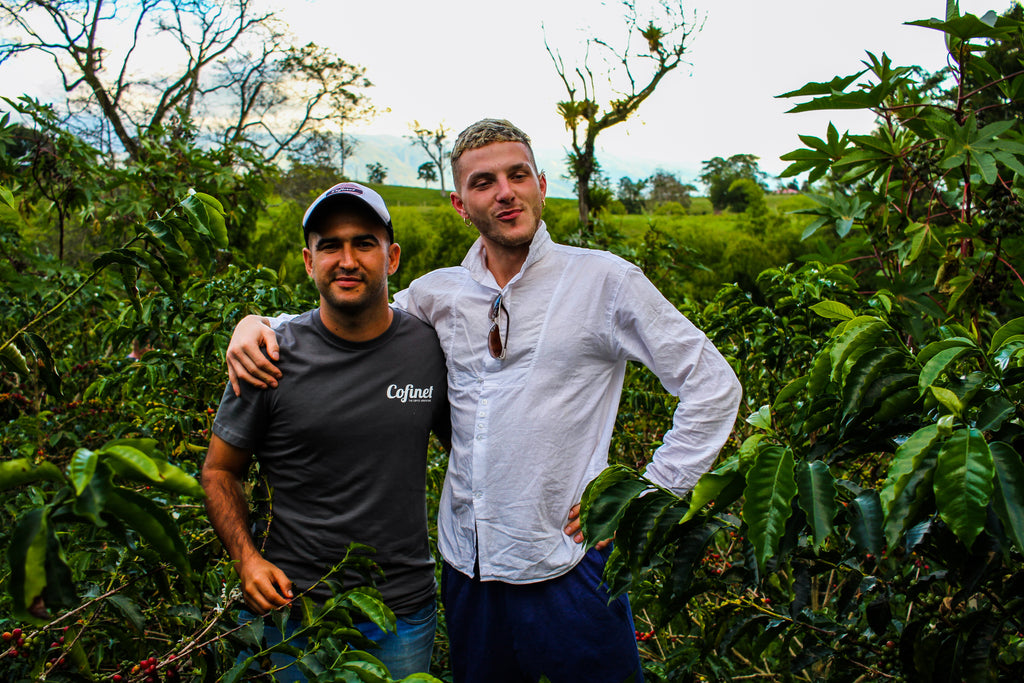
Felipe Arcila with Eli Galbally, Colombia 2017
He was the raconteur of the group, always chatting to the locals or telling stories to his fellow Australians, a captive audience on long car trips. “He was always in motion and if he was still, he was talking!” exclaims Fay. Anyone who knew Eli would be familiar with his open and voluble way of relating to the world around him.
Once the crew returned to Australia, Fay and Eli kept in touch on social media. It was late 2019 when we advertised a position in our production team and Eli applied. He dutifully followed up with a message to Fay proclaiming: “I have really matured and got my act together this year”. And he had. He was really committed to his professional development and we were thrilled for him to come on board.
Fay says “it was clear that he really really wanted to be here [and] wanted to be part of the team. It was hard not to acknowledge that and be impressed by that”. He joined the team in late December, and the months that followed were wonderful. Eli was such a complementary addition to our team.

Sadly, Eli passed away on May 23, 2020. It was a devastating loss to his family, to Padre Coffee and to the world.
We learnt many things from Eli in the five months we got to spend with him. One of the most special things about Eli was that, whatever conversation or situation he was in, whoever he was with, he was so present and engaged in that moment. He gave you his full attention and commanded you to give him yours. He taught us all to be present and pay attention.
He had the most vibrant and palpable energy of anyone I’ve ever met. As Fay put it, “he really walked to the beat of his own drum”; he was “one of a kind - you knew that as soon as you met him, he just exuded that energy”. He taught us to be the truest versions of ourselves.
He hugged us intimately and was forthcoming with his feelings. He loved freely, and warmly. He reminded us to check in with, and look after each other.
Marinus remembers him, aptly, “as that cheeky kid [he] met in Colombia, a care-free soul that showed a real interest in people and believed in their good intentions.”
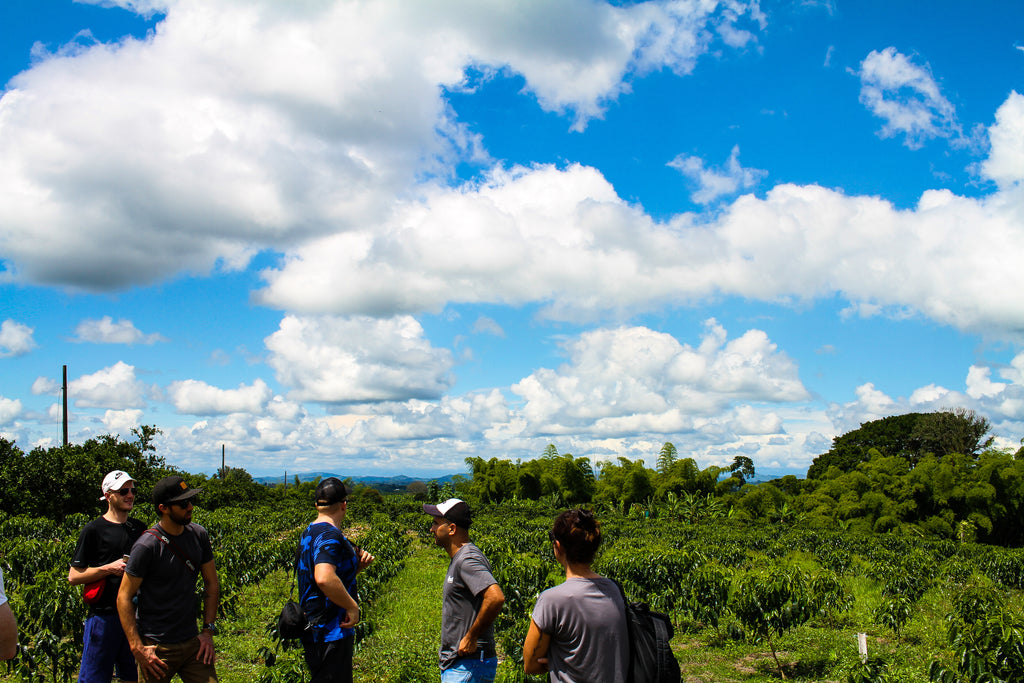
Eli Galbally (L) with the group in Colombia, 2017
Eli’s mum, Sophy, says “Eli, I know would love the opportunity to support coffee farmers. We have so many photos and stories of his time spent on the coffee farm in Colombia. He loved the people and he always talked about going back.”
Carlos put forward one of their partners, Auricel Conde, as someone we could assist. Auricel has been a campesino, or farm worker, his entire adult life, and, happily, came across an opportunity to take possession of La Primavera (The Spring) farm in Genova, Quindío. He now lives there with his brother and son, and the three of them tend the 17,000 or so coffee plants together. Since taking over ownership at the farm, they have produced some really great coffees. Working with the local co-op, however, they were paid only a few cents above the commercial grade price.
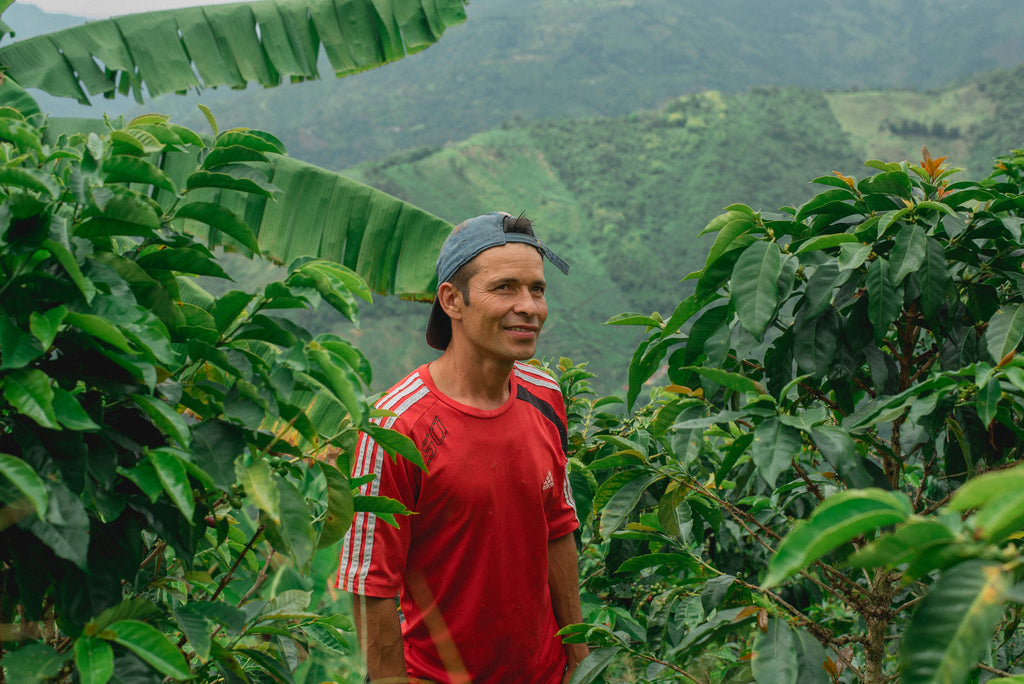
Auricel Conde at his farm, Finca La Primavera, in Genova, Quindio
Cofinet put Auricel through their internship program in 2018, and he has been producing some excellent coffees since then, increasing his income drastically. Currently, Auricel processes up to 70% of La Primavera's coffees onsite, with the remainder being processed at Pradera. Due to the great relationship they have formed, Cofinet are hoping to work more closely with Auricel in the future. To do so, they’ll start sourcing coffees from the neighbouring farms, and process them at La Primavera.
Because the facilities at La Primavera are rudimentary and require a higher amount of manual labour than more modern facilities, we’re proud to raise funds to construct a new fermentation tank for them. This fermentation tank will go a long way to helping Auricel and other farmers in the area to produce better coffees and improve their livelihoods into the future.
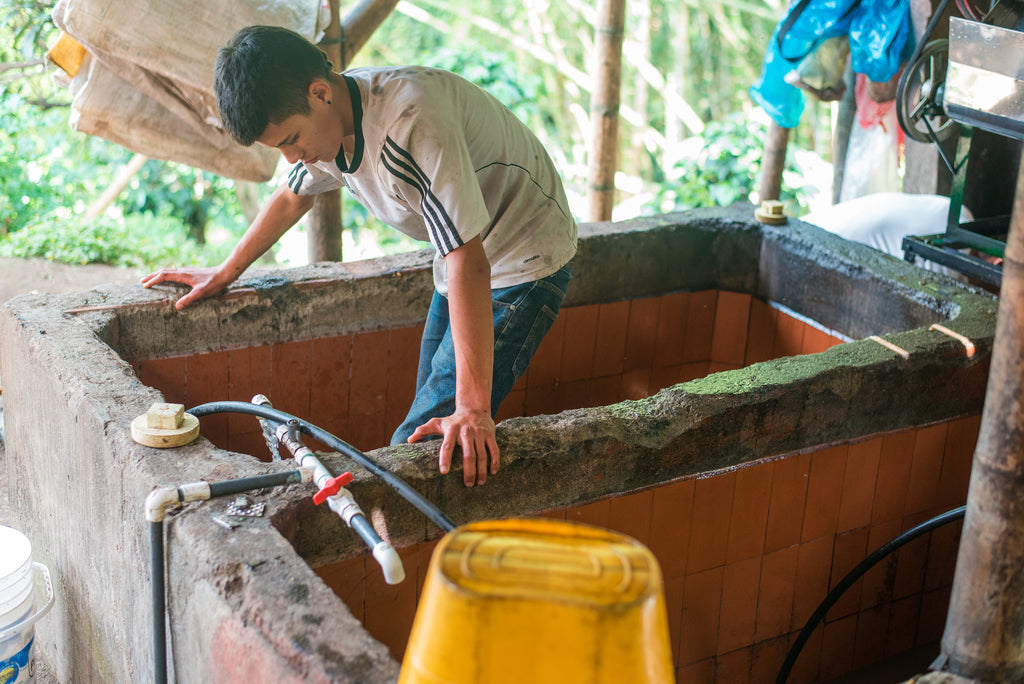
Auricel's son, Andru, with the fermentation tank at Finca La Primavera
We’re proud to be featuring two of Auricel’s outstanding coffees on our coffee menu. The coffees are both Castillo varietal, but processed two different ways: one washed and the other honey. You can read a little bit more about coffee processing here. It will be a really interesting exercise to be able to taste them side by side and be able to discern how the difference in processing methods has affected the taste of the coffee.
We’ll be donating $1 from every 250g of these coffees sold. The donation is proportional for 500g ($2) and 1kg ($4) volumes. We are hoping to raise A$5,000.00, which will cover the cost of materials; Cofinet is generously donating their time and labour to construct the fermentation tank. We’ll be sharing updates on the project as they come to hand.
The coffees and merchandise are available online and in store now.
Together with Cofinet, we thank you for your support.
With respect to Tim, Sophy and Zac Galbally, in loving memory of Eli Galbally (1991-2020).
Padre Coffee acknowledges the Traditional Custodians of Country throughout Australia and their continued connections to land, sea and community.
We pay our respect to Elders past, present and future, and extend that respect to all Aboriginal and Torres Strait Islander Peoples.